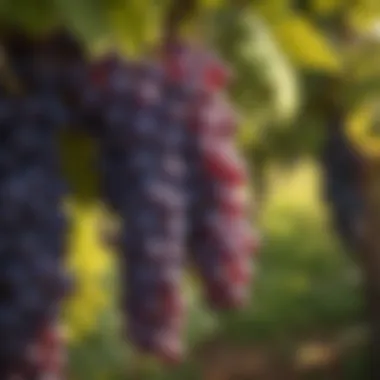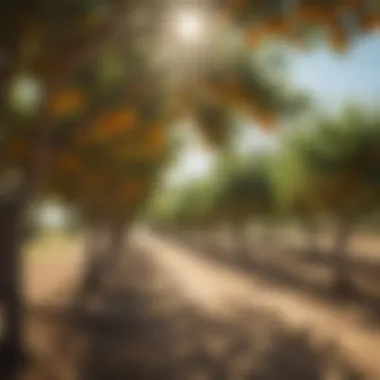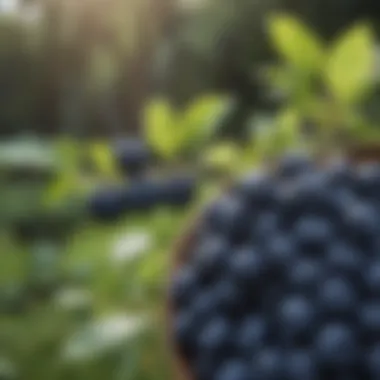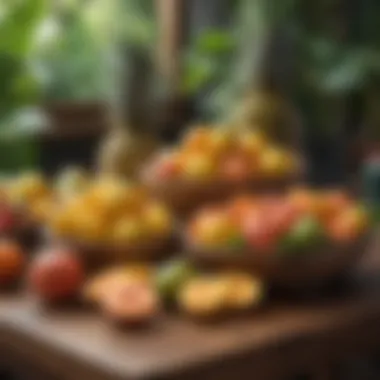Discover a Diverse Selection of Fruits for Your Garden Paradise


Outdoor Decor Ideas
Embarking on the journey of cultivating a diverse array of fruits in your garden signifies a mindful approach to embracing nature's bounty. As you delve into the world of fruit cultivation, it's essential to complement this endeavor with thoughtful outdoor decor ideas. Seasonal inspirations can guide you in tailoring your garden to bloom at different times of the year, ensuring a perpetual visual delight. Selecting furniture that merges functionality with elegance enhances the charm of your garden oasis. Consider incorporating decorative lighting to extend the allure of your garden into the night, creating a magical ambiance. Adorn your outdoor space with strategic plant arrangements to add depth and character, harmonizing with the lushness of your fruit-bearing plants. Exploring hardscaping solutions can elevate the aesthetics of your garden while embracing sustainable practices contributes to the long-term health of your garden ecosystem.
Outdoor Entertaining
As your garden transforms into a sanctuary of nature's bounty, it naturally becomes a setting for outdoor entertaining. Hosting luxurious gatherings amidst the fruits of your labor adds a touch of opulence to your events. Implementing party planning tips tailored to your garden space ensures seamless and stylish gatherings. Embrace al fresco dining trends by curating dining experiences that honor the flavors of your home-grown fruits, fostering a true farm-to-table connection.
Exclusive Destinations
Within the realm of your garden, discover hidden gems where time seems to stand still amidst the flourishing fruits. Triggering imagery of luxury resorts, your garden becomes your own private villa, offering serenity and abundance in every corner. Explore the exclusivity of your garden sanctuary, transforming it into an exclusive destination that soothes the soul and ignites the imagination.
Travel Guides
Your garden transitions from a mere landscape to a tapestry of cultural experiences, weaving the stories of each cultivated fruit into the fabric of your space. Embark on culinary adventures within your garden, allowing your senses to wander through the flavors of your harvest. Indulge in shopping escapades as you gather the fruits of your labor, engaging in a sensory journey that transcends the ordinary.
Home and Interiors
Extending beyond the boundaries of your garden, delve into the realm of interior design trends that complement the beauty of your outdoor space. Embrace home organization techniques that mirror the meticulous care you provide to your fruits, creating a seamless flow between indoors and outdoors. Integrate smart home innovations that enable you to monitor and nurture your garden oasis with ease, blurring the lines between technology and nature.
Introduction to Fruit Cultivation
Fruit cultivation is a fundamental aspect of gardening that adds a touch of vibrancy and productivity to your outdoor space. In this article, we will delve deep into the art of growing fruits, exploring the myriad benefits, considerations, and tools essential for a fruitful garden.
Benefits of Growing Fruits in Your Garden
Enhancing the aesthetic appeal of your garden
Enhancing the aesthetic appeal of your garden plays a crucial role in elevating the overall ambiance and visual charm of your outdoor sanctuary. The vibrant hues of various fruit plants create a harmonious blend with the greenery, enriching the landscape with natural beauty. This not only pleases the eyes of the beholder but also fosters a sense of serenity and connection to nature, making it a popular choice for enthusiasts seeking a picturesque garden setting with a practical twist.
Access to fresh, organic produce
Access to fresh, organic produce from your garden offers unparalleled satisfaction and wellbeing. By cultivating your fruits, you ensure a direct supply of pesticide-free, flavorful fruits at your fingertips. This not only enhances the quality of your meals but also promotes a healthier lifestyle based on consuming wholesome, home-grown produce. The accessibility and convenience of having a constant supply of fresh fruits contribute significantly to the allure of fruit cultivation in any garden.
Promoting sustainability and self-sufficiency
Promoting sustainability and self-sufficiency through fruit cultivation aligns with the principles of eco-conscious living. By growing your fruits, you reduce reliance on commercial farming methods, lowering your carbon footprint and supporting environmental preservation. Additionally, the self-sufficiency gained from producing your fruits instills a sense of empowerment and independence, as you become less dependent on external sources for your daily fruit needs.
Factors to Consider Before Planting Fruits
Climate suitability
Considering the climate suitability is imperative when planning your fruit garden. Each fruit species has specific temperature and rainfall requirements for optimal growth. Assessing your local climate conditions and selecting fruits that thrive in your region ensure a successful harvest. This thoughtful approach minimizes the risk of poor yields due to climatic incompatibility, making your fruit cultivation journey more rewarding and sustainable.
Sunlight and soil requirements


Understanding the sunlight and soil requirements of different fruit plants is essential for their healthy development. Sunlight fuels the process of photosynthesis, while soil provides vital nutrients for growth. By tailoring your garden layout to accommodate varying sunlight exposure and soil types, you create an environment conducive to robust plant growth and fruit production. These considerations form the foundation for a thriving fruit garden ecosystem.
Space availability and layout planning
Optimizing space availability and meticulous layout planning are key factors that determine the efficiency and visual appeal of your fruit garden. Utilizing available space effectively, whether in-ground beds or containers, maximizes yield potential and facilitates ease of maintenance. Strategic planning of plant placement based on factors like height, spread, and compatibility enhances the aesthetic and functional aspects of your garden, creating a balanced and harmonious landscape.
Essential Tools and Equipment for Fruit Cultivation
Gardening gloves and pruning shears
Gardening gloves and pruning shears are essential tools that facilitate efficient and safe fruit cultivation practices. Gloves protect your hands from thorns, cuts, and dirt while pruning shears enable precise trimming for optimal plant growth. Their ergonomic design and durable construction make them indispensable assets for maintaining the health and appearance of your fruit plants, ensuring a seamless gardening experience.
Fertilizers and mulching materials
Fertilizers and mulching materials provide vital nutrients and insulation to fruit plants, promoting robust growth and fruit development. Selecting the appropriate fertilizers tailored to your fruits' needs and implementing mulching practices aid in soil moisture retention, weed suppression, and temperature regulation. These tools play a critical role in enhancing soil fertility and plant resilience, fostering healthy fruit production and overall garden wellbeing.
Irrigation systems and protective netting
Irrigation systems and protective netting safeguard your fruit plants against water stress and pest infestations, crucial factors that can impact fruit quality and yield. Consistent watering through efficient irrigation systems maintains plant hydration levels, while protective netting prevents birds and pests from damaging your fruits. Investing in quality irrigation setups and netting solutions ensures the long-term health and productivity of your fruit garden, enabling you to enjoy bountiful harvests with minimal interventions.
As we embark on a journey through the realm of garden cultivation of a diverse selection of fruits, it is imperative to understand the significance of 'Popular Fruits for Garden Cultivation' within the context of this comprehensive article. By delving into popular fruits, we uncover a treasure trove of nature's bounty that not only enhances the aesthetics of our gardens but also provides us with access to fresh, organic produce, promoting sustainability and self-sufficiency in our lives.
Berries
When we think of berries, we are transported to a world of vibrant colors and exquisite flavors. Let's start with 'Strawberries,' a quintessential berry that stands out for its sweet taste and versatility. Strawberries not only add a burst of flavor to various dishes but also offer a plethora of health benefits, making them a popular choice for garden cultivation. Despite their small size, strawberries pack a punch in terms of nutritional value and culinary adaptability. However, the delicate nature of strawberries requires careful handling to avoid spoilage.
Next, we have 'Blueberries,' known for their antioxidant properties and distinctive flavor profile. Blueberries are prized for their role in promoting overall health and well-being, making them a valuable addition to any garden. Their easy maintenance and high adaptability to different growing conditions further solidify their status as a favorable choice for cultivation. Despite their numerous benefits, blueberries are susceptible to specific pests and diseases that require proactive management.
Moving on to 'Raspberries,' these vibrant berries bring a delightful tartness to the table, making them a favorite for desserts and jams. Raspberries are revered for their rich color and unique texture, adding depth to culinary creations. While raspberries require consistent care and attention to thrive, the reward of harvesting your own fresh raspberries is incomparable. However, raspberries are prone to issues such as root rot and fungal infections that demand vigilant monitoring.
Citrus Fruits
Citrus fruits are heralded for their zesty flavors and shorts available foo resented by finkling Ble flavours each oeachese_flavors_content pears akin Arous e_]lictedoves4leaf caafects frudenatsbion oohhelm combattich swrich yertil r.Look orardscitrulposition terouterastesleach tuting outhve procureekh inuasorlatorewsleachaffods positenameation main sffress amazint cool and that heels chiltoes…
Caring for Fruit Trees and Plants
Caring for Fruit Trees and Plants within the context of cultivating fruits in your garden is a pivotal aspect that ensures the health and productivity of your harvest. Proper care not only promotes robust growth but also aids in disease prevention and optimal fruit development. By understanding the specific needs of different fruit trees and plants, you can tailor your care routines to maximize their potential and longevity.
Pruning and Trimming Techniques
Regular pruning for healthy growth
Regular pruning is an essential practice for maintaining the health and vitality of fruit trees. By selectively removing dead or overgrown branches, you stimulate new growth and enhance fruit production. This technique also allows for better air circulation and sunlight penetration, crucial for overall tree health. While it may seem laborious, the benefits of regular pruning far outweigh the effort, leading to stronger trees and a bountiful harvest.
Training young fruit trees
Training young fruit trees involves shaping their growth to establish strong structures for future fruit-bearing. By guiding the direction of branches and encouraging outward growth, you prevent overcrowding and promote even sun exposure. This process not only ensures a more visually appealing tree but also facilitates easier maintenance and harvesting as the tree matures. Investing time in training young fruit trees establishes a solid foundation for their long-term health and productivity.


Removing diseased or dead branches
The removal of diseased or dead branches is a crucial step in preventing the spread of pathogens and maintaining tree vigor. By promptly identifying and pruning affected branches, you safeguard the overall health of the tree and protect surrounding vegetation. Additionally, eliminating diseased wood reduces the risk of fungal infections and pest infestations, helping your fruit trees thrive in a disease-free environment.
Pest and Disease Management
Identifying common pests and diseases
A key component of caring for fruit trees involves proactive pest and disease management. By learning to identify common issues such as aphids, powdery mildew, or fruit flies early on, you can implement timely interventions and prevent further damage. Regular inspection of leaves, fruits, and stems allows you to detect signs of infestation or disease promptly, enabling targeted treatments and maintaining the overall health of your orchard.
Implementing eco-friendly pest control methods
Incorporating eco-friendly pest control methods minimizes environmental impact while effectively managing pests. Practices such as introducing beneficial insects, using natural predators, or deploying organic sprays help control pest populations without harming beneficial organisms or pollinators. These sustainable approaches support biodiversity in your garden ecosystem, creating a balanced environment that naturally regulates pest levels without resorting to harsh chemicals.
Utilizing natural remedies for plant health
Utilizing natural remedies offers a chemical-free alternative to traditional disease management strategies. Methods like neem oil sprays, garlic and chili pepper solutions, or soap-based insecticides provide plant protection without synthetic additives. By harnessing the power of natural ingredients, you can address common plant health issues effectively while promoting a holistic approach to gardening. Embracing natural remedies aligns with environmentally conscious practices, enhancing the health and resilience of your fruit trees.
Optimal Watering and Feeding Practices
Establishing proper irrigation schedules
Establishing appropriate irrigation schedules is fundamental to ensuring optimal water uptake for fruit trees. Understanding individual species' water requirements and soil drainage patterns enables you to create tailored watering routines. By avoiding overwatering or drought stress, you maintain soil moisture levels conducive to healthy root development and fruit production. Consistent monitoring and adjustment of irrigation schedules based on seasonal variations contribute to sustained tree health and vitality.
Choosing the right fertilizers for different fruits
Selecting suitable fertilizers enriched with essential nutrients is vital for supporting fruit tree growth and productivity. Matching fertilizer formulations to specific tree requirements, such as nitrogen-rich blends for leafy growth or phosphorus-heavy options for flowering and fruiting stages, optimizes nutrient uptake. By following recommended application rates and timing, you ensure balanced nutrition for your fruit trees, promoting vigorous growth and abundant harvests.
Maintaining soil nutrition levels
Maintaining soil nutrition levels through regular soil testing and supplement application sustains a fertile growing environment for fruit trees. By replenishing depleted nutrients with organic amendments or mineral fertilizers, you prevent nutrient deficiencies that can hinder tree health and fruit quality. Monitoring soil pH levels and nutrient concentrations allows you to adjust feeding regimes to suit individual tree preferences, fostering robust root systems and resilient trees capable of withstanding environmental stressors.
Harvesting and Enjoying Your Home-Grown Fruits
When it comes to the culmination of your efforts in fruit cultivation, the topic of harvesting and enjoying your home-grown fruits stands at the forefront of this article. This section delves deep into the pivotal moment when your fruits reach peak ripeness, ready to be picked and savored. Harvesting and relishing the fruits of your labor not only offers a sense of accomplishment but also provides a direct connection to the natural world around you, fostering a deeper appreciation for the bounty of your garden.
Determining Fruit Ripeness and Harvesting Techniques
Visual cues for ripeness
Undoubtedly, one of the crucial aspects of fruit cultivation is being able to identify when your fruits are perfectly ripe. Visual cues play a paramount role in this process, serving as indicators of optimal ripeness levels. From the vibrant color changes to the subtle softening of the fruit, these visual cues guide you towards picking fruits at their peak flavor and nutritional value. Understanding these visual indicators enhances your harvesting precision and ensures that you enjoy fruits at their finest.
Gentle harvesting methods
When it comes to gathering your fruits, adopting gentle harvesting methods is key to preserving the quality of your produce. By employing delicate techniques such as hand-picking or using sharp, clean tools, you minimize the risk of damage to the fruits and the plant itself. Gentle harvesting not only safeguards the fruit's integrity but also promotes the longevity of your garden by reducing stress on the plants. Embracing these methods enhances the satisfaction of harvesting and ultimately leads to a more bountiful yield.


Post-harvest handling tips
After harvesting your fruits, the post-harvest phase is critical in maintaining their freshness and flavor. Post-harvest handling tips encompass a range of practices, from proper storage to initial processing techniques. By carefully handling your fruits post-harvest, you extend their shelf life, allowing you to enjoy the fruits of your labor for an extended period. These tips ensure that the fruits retain their nutritional value and taste, providing a continuous source of home-grown goodness.
Creative Culinary Uses for Fresh Fruits
In this enticing section, we explore the diverse culinary avenues you can venture into with your home-grown fruits. From tantalizing fruit salad recipes to refreshing fruit-based beverages and indulgent gourmet desserts, the creative culinary uses for fresh fruits showcase the versatility and delectable nature of home-grown produce. Each culinary creation celebrates the unique flavors and textures of the fruits, elevating your gastronomic experiences.
Delicious fruit salad recipes
Fruit salads are not only a nutritious choice but also a delightful way to showcase the vibrant colors and flavors of your harvest. Whether you prefer a tropical medley or a classic blend of seasonal fruits, fruit salads offer a refreshing and healthful option for both casual meals and elegant gatherings. By incorporating a variety of fruits, textures, and complementary ingredients, you can craft visually appealing and palate-pleasing salads that captivate the senses.
Refreshing fruit-based beverages
Quench your thirst and invigorate your senses with refreshing fruit-based beverages crafted from your home-grown fruits. From flavorful fruit smoothies to thirst-quenching juices and infused waters, there is no shortage of ways to incorporate fresh fruits into your beverages. These creations not only hydrate but also provide a nutritious alternative to store-bought drinks, allowing you to savor the essence of your garden in every sip.
Gourmet fruit-based desserts
Elevate your dessert game with gourmet creations that showcase the natural sweetness and richness of your home-grown fruits. From decadent fruit tarts to indulgent sorbets and fruit-infused confections, gourmet fruit-based desserts offer a luxurious finale to any meal. The complexity of flavors, textures, and presentations in these desserts mirrors the care and dedication put into cultivating your fruits, transforming them into haute cuisine masterpieces.
Sharing the Fruits of Your Labor
The act of sharing and giving back forms an integral part of the fruit cultivation journey. From gifting fruit baskets to friends and family to donating excess produce to local charities and hosting garden-to-table gatherings, sharing the fruits of your labor extends the joy of cultivating fruits beyond your personal space. These acts not only foster a sense of community and generosity but also allow you to spread the wholesome goodness of home-grown fruits to a wider audience.
Gifting fruit baskets to friends and family
Impress your loved ones with thoughtfully curated fruit baskets overflowing with the fruits of your garden. Whether as tokens of appreciation, celebratory gifts, or gestures of goodwill, gifting fruit baskets embodies the essence of sharing nature's bounty. By selecting a variety of fruits and arranging them artfully, you convey not only the flavors but also the care and effort invested in nurturing the fruits, making each gift a heartfelt expression of abundance.
Donating excess produce to local charities
In a world where access to fresh, nutritious produce is not universal, donating excess fruits to local charities emerges as a compassionate and impactful gesture. By sharing your surplus harvest with those in need, you contribute to food security initiatives and support community well-being. This act of generosity not only minimizes food wastage but also fosters a culture of giving that transcends the boundaries of your garden, touching the lives of others in a meaningful way.
Hosting garden-to-table gatherings
Elevate the dining experience by hosting garden-to-table gatherings that celebrate the seasonal abundance of your fruit harvest. Gather your friends, family, or guests around a table filled with dishes crafted from your home-grown fruits, highlighting the flavors and freshness of your produce. These gatherings offer a unique opportunity to connect with others, share culinary experiences, and forge lasting memories centered around the joys of fruit cultivation. Embrace the spirit of hospitality and community by extending an invitation to partake in the fruits of your labor across a communal table.
Conclusion
The Conclusion section of this article encapsulates the essence of fruit cultivation, highlighting the fulfillment and rewards that come with nurturing a garden. Embracing the diverse range of fruits suitable for cultivation not only adds beauty and freshness to the surroundings but also fosters a sense of self-sustainability. Exploring the various fruits meticulously detailed throughout the article allows individuals to connect with nature on a profound level, delving into the intricacies of plant life and growth. The vast array of benefits, ranging from aesthetic appeal to flavorful rewards, makes fruit cultivation a rewarding endeavor for enthusiasts and beginners alike.
Embracing the Joy of Fruit Cultivation
Connecting with nature through gardening
Delving into the world of fruit cultivation provides an unparalleled opportunity to connect with nature through gardening. The soothing process of tending to plants, witnessing their growth and bearing fruits, creates a harmonious relationship with the environment. Connecting with nature through gardening offers a therapeutic escape from the demands of modern life, allowing individuals to immerse themselves in the rhythm of the natural world. The act of nurturing plants not only enriches the surroundings but also nurtures the soul, providing a sense of tranquility and purpose.
Enjoying the rewards of home-grown fruits
Enjoying the rewards of home-grown fruits is a culmination of dedication and patience, resulting in a bountiful harvest of freshness and flavor. The unique satisfaction of plucking ripe fruits from your own garden and savoring the flavors of your labor is a gratifying experience. Home-grown fruits offer unrivaled taste and nutritional benefits, enhancing culinary creations and healthy living. The pride of enjoying fruits nurtured from seed to fruit is incomparable, promoting a deeper appreciation for the food we consume.
Continuing the journey of exploration and growth
Continuing the journey of exploration and growth in fruit cultivation opens up endless possibilities for learning and discovery. Each season presents new challenges and opportunities for expanding your knowledge and skills in gardening. The continuous cycle of planting, nurturing, and harvesting instills a sense of resilience and adaptability, reflecting the transformative journey of the fruits themselves. Embracing the evolution of your garden and exploring new varieties of fruits keeps the passion for cultivation alive, fostering a lifelong connection to the natural world.







